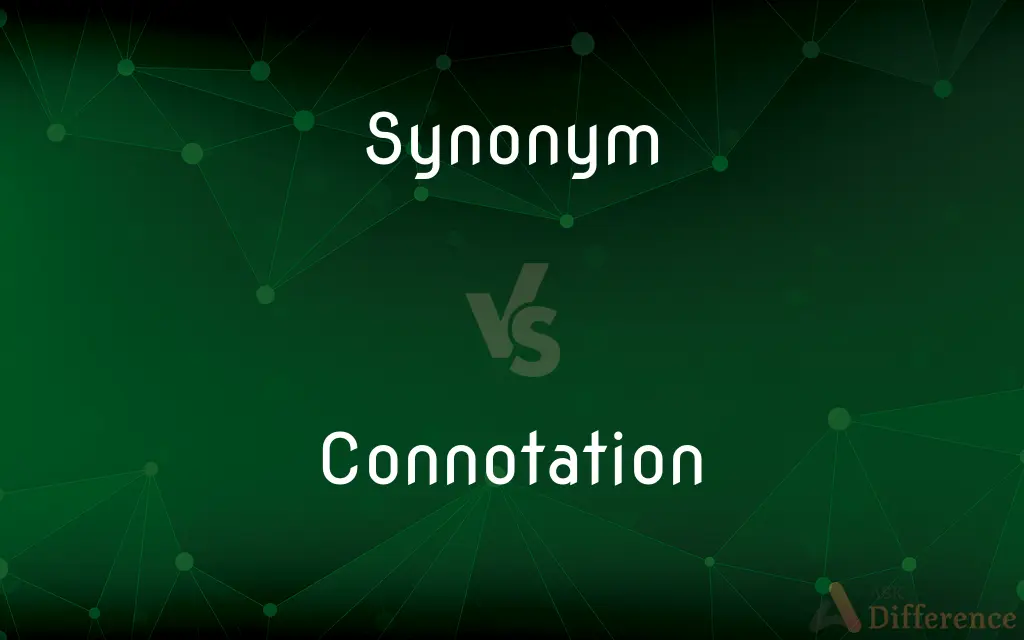Synonym vs. Connotation — What's the Difference?
By Fiza Rafique & Maham Liaqat — Updated on April 9, 2024
A synonym is a word with the same or similar meaning as another word, focusing on semantic equivalence; connotation refers to the feelings, associations, or emotions a word evokes, beyond its literal meaning.

Difference Between Synonym and Connotation
Table of Contents
ADVERTISEMENT
Key Differences
Synonyms are words or phrases that can be interchanged in some contexts without changing the overall meaning of the sentence. They are primarily used to avoid repetition or to adjust the level of specificity or formality in communication. For example, "happy" and "joyful" are synonyms that convey a similar sense of pleasure or contentment. Connotation, on the other hand, delves into the emotional and cultural nuances attached to a word, which can significantly affect interpretation.
The distinction between synonyms and connotation is crucial in both written and spoken language, influencing tone, style, and clarity. Synonyms allow a speaker or writer to choose from a variety of words with similar meanings but perhaps different levels of intensity or formality. Connotation plays a key role in the subtext or implied meanings, guiding the audience toward a particular emotional or cultural understanding.
Understanding synonyms is fundamental to expanding one’s vocabulary and mastering the nuances of language. It enables more precise and varied expression. Understanding connotation, however, is essential for grasping the deeper, often unspoken layers of meaning in communication. It requires sensitivity to cultural and emotional contexts, as well as an awareness of the audience’s likely interpretations.
In practical use, the choice between synonyms or the awareness of connotation can dramatically affect the message's reception. For example, describing a house as "cozy" instead of "small" (synonyms in some contexts) can convey a warmer, more positive feeling due to the positive connotations of "cozy." This demonstrates how connotations can add depth and emotion to communication, enriching the literal meaning conveyed by synonyms.
The interaction between synonyms and connotation underscores the complexity of language and communication. While synonyms provide the flexibility to choose among words with similar dictionary definitions, connotations require an understanding of the broader, often subjective associations words carry. This interplay is what allows language to capture the full spectrum of human experience and emotion.
ADVERTISEMENT
Comparison Chart
Definition
A word that has the same or nearly the same meaning as another word.
The emotional, cultural, or implied meaning that a word suggests.
Purpose
To provide alternative expressions for similar concepts, enhancing vocabulary richness.
To evoke specific feelings, associations, or attitudes beyond literal meanings.
Focus
Semantic equivalence and lexical variety.
Emotional and cultural associations of words.
Usage
Used for clarity, variety, and adjusting formality in communication.
Used to convey and evoke nuanced meanings and tones in communication.
Example
"Happy" is a synonym for "joyful."
"Home" connotes warmth and security, beyond its literal meaning as a place where one lives.
Compare with Definitions
Synonym
Alternative expressions to enhance communication.
Using ‘intelligent’ as a synonym for ‘smart’ adds variety to speech.
Connotation
Associations extending beyond literal meaning.
‘Dove’ connotes peace beyond its meaning as a bird.
Synonym
Vocabulary that enriches language expression.
Synonyms like ‘elated’ for ‘happy’ provide depth to writing.
Connotation
The implied meaning affecting interpretation.
‘Childish’ has negative connotations of immaturity.
Synonym
Terms interchangeable in specific contexts.
‘End’ can be used as a synonym for ‘conclusion’ in certain situations.
Connotation
Emotional or cultural implications of words.
The word ‘youthful’ has positive connotations of energy and vitality.
Synonym
Lexical items offering nuanced meanings.
‘Terrified’ is a stronger synonym for ‘scared.’
Connotation
Nuanced meanings influencing communication.
‘Economical’ has positive connotations of efficiency, unlike ‘cheap.’
Synonym
Words with similar meanings.
‘Fast’ is a synonym for ‘quick.’
Connotation
Words evoking specific feelings or attitudes.
The connotation of ‘home’ is warmth and safety.
Synonym
A synonym is a word, morpheme, or phrase that means exactly or nearly the same as another word, morpheme, or phrase in the same language. For example, the words begin, start, commence, and initiate are all synonyms of one another; they are synonymous.
Connotation
A connotation is a commonly understood cultural or emotional association that any given word or phrase carries, in addition to its explicit or literal meaning, which is its denotation. A connotation is frequently described as either positive or negative, with regard to its pleasing or displeasing emotional connection.
Synonym
A word or phrase that means exactly or nearly the same as another word or phrase in the same language, for example shut is a synonym of close
‘the East’ was a synonym for the Soviet empire
‘shut’ is a synonym of ‘close’
Connotation
The act or process of connoting.
Synonym
A word having the same or nearly the same meaning as another word or other words in a language.
Connotation
An idea or meaning suggested by or associated with a word or thing
Hollywood holds connotations of romance and glittering success.
Synonym
A word or expression that serves as a figurative or symbolic substitute for another
"Romeo has become a synonym for any youthful lover" (Harry Levin).
Connotation
The set of associations implied by a word in addition to its literal meaning.
Synonym
(Biology) One of two or more scientific names that have been applied to the same species or other taxonomic group.
Connotation
(Logic) The set of attributes constituting the meaning of a term; intension.
Synonym
A word whose meaning is the same as that of another word.
Connotation
(semantics) A meaning of a word or phrase that is suggested or implied, as opposed to a denotation, or literal meaning. A characteristic of words or phrases, or of the contexts that words and phrases are used in.
The word "advisedly" has a connotation of "wisely", although it denotes merely "intentionally" and "deliberately."
The word "happy" has a positive connotation, while "sad" has a negative connotation.
Synonym
A word or phrase with a meaning that is the same as, or very similar to, another word or phrase.
“Happy” is a synonym of “glad”.
Connotation
(logic) The attribute or aggregate of attributes connoted by a term, contrasted with denotation.
The two expressions "the morning star" and "the evening star" have different connotations but the same denotation (i.e. the planet Venus).
Synonym
(zoology) Any of the formal names for a taxon, including the valid name (i.e. the senior synonym).
Connotation
The act of connoting; a making known or designating something additional; implication of something more than is asserted.
Synonym
Any name for a taxon, usually a validly published, formally accepted one, but often also an unpublished name.
Connotation
A meaning implied but not explicitly denoted by some word or expression, which may be understood in addition to the explicit primary meaning.
Synonym
(databases) An alternative (often shorter) name defined for an object in a database.
Connotation
The full set of necessary properties possessed by all the objects within the extension of a term; the intensional meaning of a term, which determines the objects to which the term applies; the intension of a term.
Synonym
One of two or more words (commonly words of the same language) which are equivalents of each other; one of two or more words which have very nearly the same signification, and therefore may often be used interchangeably. See under Synonymous.
All languages tend to clear themselves of synonyms as intellectual culture advances, the superfluous words being taken up and appropriated by new shades and combinations of thought evolved in the progress of society.
His name has thus become, throughout all civilized countries, a synonym for probity and philanthropy.
In popular literary acceptation, and as employed in special dictionaries of such words, synonyms are words sufficiently alike in general signification to be liable to be confounded, but yet so different in special definition as to require to be distinguished.
Connotation
What you must know in order to determine the reference of an expression
Synonym
An incorrect or incorrectly applied scientific name, as a new name applied to a species or genus already properly named, or a specific name preoccupied by that of another species of the same genus; - so used in the system of nomenclature (which see) in which the correct scientific names of certain natural groups (usually genera, species, and subspecies) are regarded as determined by priority.
Connotation
An idea that is implied or suggested
Synonym
One of two or more words corresponding in meaning but of different languages; a heteronym.
Synonym
Two words that can be interchanged in a context are said to be synonymous relative to that context
Common Curiosities
What does connotation mean?
Connotation refers to the emotional, cultural, or implied meaning a word suggests, beyond its dictionary definition.
Can the connotation of a word change over time?
Yes, the connotation of a word can evolve due to cultural shifts, changes in societal attitudes, or reclamation by communities.
Can synonyms have different connotations?
Yes, synonyms can carry different connotations, influencing how they are perceived and the emotions they evoke.
Why is understanding connotations important in communication?
Understanding connotations is crucial for effectively conveying and interpreting nuanced emotional and cultural meanings.
Is it possible for a word to have both positive and negative connotations?
Yes, a word can have both positive and negative connotations, depending on the context and the speaker or writer’s intent.
How do synonyms and connotations differ in their use?
Synonyms are used to provide lexical variety and adjust the level of formality, while connotations are used to evoke specific feelings or imply meanings beyond the literal.
What is a synonym?
A synonym is a word that has the same or nearly the same meaning as another word, allowing for variety in language use.
How can understanding synonyms and connotations improve language skills?
Understanding synonyms and connotations enhances vocabulary, expressive range, and the ability to communicate effectively and empathetically.
How does one choose the right synonym to use?
Choosing the right synonym involves considering the context, the desired tone, and the specific nuances or connotations associated with each option.
Do connotations affect the emotional impact of communication?
Absolutely, connotations significantly affect the emotional impact of communication by adding layers of meaning that influence the audience’s response.
Share Your Discovery

Previous Comparison
Weight vs. Capacity
Next Comparison
Maltitol vs. SorbitolAuthor Spotlight
Written by
Fiza RafiqueFiza Rafique is a skilled content writer at AskDifference.com, where she meticulously refines and enhances written pieces. Drawing from her vast editorial expertise, Fiza ensures clarity, accuracy, and precision in every article. Passionate about language, she continually seeks to elevate the quality of content for readers worldwide.
Co-written by
Maham Liaqat















































